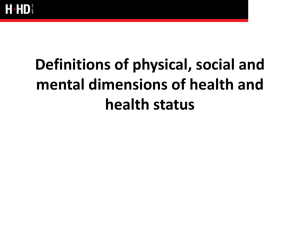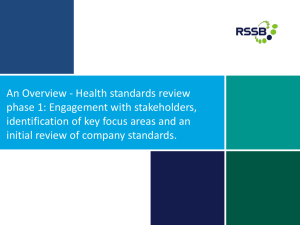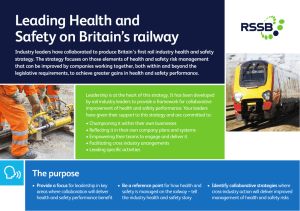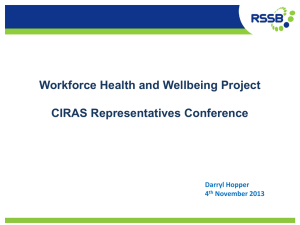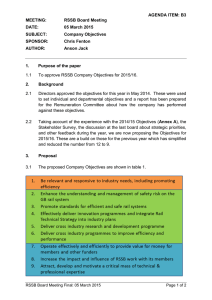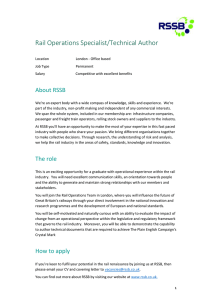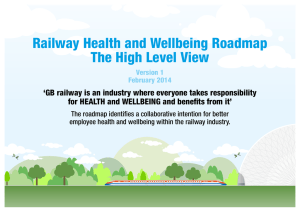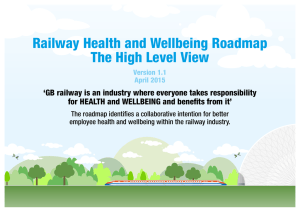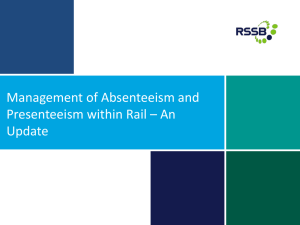TITLE:
advertisement
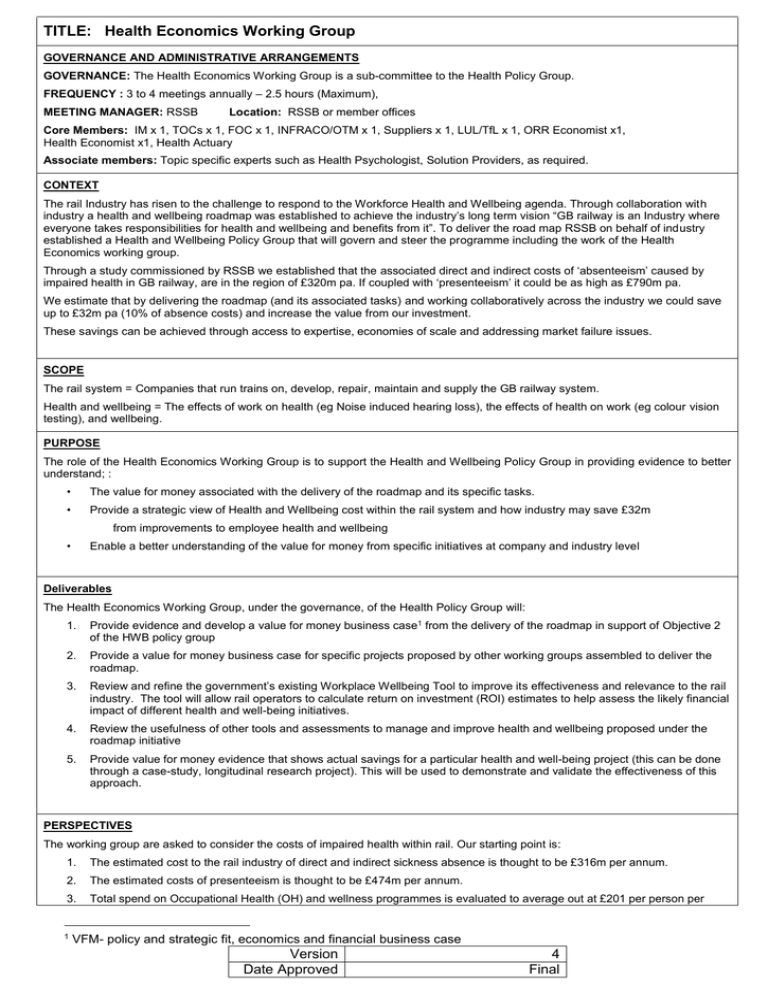
TITLE: Health Economics Working Group GOVERNANCE AND ADMINISTRATIVE ARRANGEMENTS GOVERNANCE: The Health Economics Working Group is a sub-committee to the Health Policy Group. FREQUENCY : 3 to 4 meetings annually – 2.5 hours (Maximum), MEETING MANAGER: RSSB Location: RSSB or member offices Core Members: IM x 1, TOCs x 1, FOC x 1, INFRACO/OTM x 1, Suppliers x 1, LUL/TfL x 1, ORR Economist x1, Health Economist x1, Health Actuary Associate members: Topic specific experts such as Health Psychologist, Solution Providers, as required. CONTEXT The rail Industry has risen to the challenge to respond to the Workforce Health and Wellbeing agenda. Through collaboration with industry a health and wellbeing roadmap was established to achieve the industry’s long term vision “GB railway is an Industry where everyone takes responsibilities for health and wellbeing and benefits from it”. To deliver the road map RSSB on behalf of industry established a Health and Wellbeing Policy Group that will govern and steer the programme including the work of the Health Economics working group. Through a study commissioned by RSSB we established that the associated direct and indirect costs of ‘absenteeism’ caused by impaired health in GB railway, are in the region of £320m pa. If coupled with ‘presenteeism’ it could be as high as £790m pa. We estimate that by delivering the roadmap (and its associated tasks) and working collaboratively across the industry we could save up to £32m pa (10% of absence costs) and increase the value from our investment. These savings can be achieved through access to expertise, economies of scale and addressing market failure issues. SCOPE The rail system = Companies that run trains on, develop, repair, maintain and supply the GB railway system. Health and wellbeing = The effects of work on health (eg Noise induced hearing loss), the effects of health on work (eg colour vision testing), and wellbeing. PURPOSE The role of the Health Economics Working Group is to support the Health and Wellbeing Policy Group in providing evidence to better understand; : • The value for money associated with the delivery of the roadmap and its specific tasks. • Provide a strategic view of Health and Wellbeing cost within the rail system and how industry may save £32m from improvements to employee health and wellbeing • Enable a better understanding of the value for money from specific initiatives at company and industry level Deliverables The Health Economics Working Group, under the governance, of the Health Policy Group will: 1. Provide evidence and develop a value for money business case1 from the delivery of the roadmap in support of Objective 2 of the HWB policy group 2. Provide a value for money business case for specific projects proposed by other working groups assembled to deliver the roadmap. 3. Review and refine the government’s existing Workplace Wellbeing Tool to improve its effectiveness and relevance to the rail industry. The tool will allow rail operators to calculate return on investment (ROI) estimates to help assess the likely financial impact of different health and well-being initiatives. 4. Review the usefulness of other tools and assessments to manage and improve health and wellbeing proposed under the roadmap initiative 5. Provide value for money evidence that shows actual savings for a particular health and well-being project (this can be done through a case-study, longitudinal research project). This will be used to demonstrate and validate the effectiveness of this approach. PERSPECTIVES The working group are asked to consider the costs of impaired health within rail. Our starting point is: 1. The estimated cost to the rail industry of direct and indirect sickness absence is thought to be £316m per annum. 2. The estimated costs of presenteeism is thought to be £474m per annum. 3. Total spend on Occupational Health (OH) and wellness programmes is evaluated to average out at £201 per person per 1 VFM- policy and strategic fit, economics and financial business case Version Date Approved 4 Final annum. 4. Lost Time Rate (LTR) across the rail sector is approximately 3.9%. 5. An LTR reduction of just 0.4% would deliver savings in sickness absence costs alone of £32m per annum. These are the figures that need to be robust and meaningful within rail. EXPECTATIONS Members of the group will: 1. Seek to understand the key health figures more fully and to monitor improvement for industry stakeholders. 2. Seek to fully understand the reliability/usefulness of the figures, as it is open to question, and if appropriate how to manipulate/change them to create improvements for industry. 3. Look to demonstrate how spending on preventative measures can be increased to reduce losses to industry. 4. Seek to understand how ill health prevention money is spent and where possible create initiatives to spend it better. MEMBERSHIP RSSB is transparent in its relationships with cross industry groups, therefore group members are expected to be aware and agree that data on the group and its membership is to be made accessible. The members of the health economics group are: Name Company Role Bridget Juniper (Chair) Work and Wellbeing Health Expert Paul Whitehead Balfour Beatty Safety Policy & Governance Manager Mike Tyler Lockton Health Actuary Tracey Robinson Mersey Rail HR Manager Nayia Solea Siemens Occupational Health & Wellbeing Specialist Chris Jones Network Rail Head of Health and Wellness Strategy Steve Bevan Work Foundation Stuart Parsons Southern Elise Weeder and/or James Tricker ORR Mark Whitcher Freightliner HR Director CHAIR: DEPUTY CHAIR: Version Date Approved 4 Final


